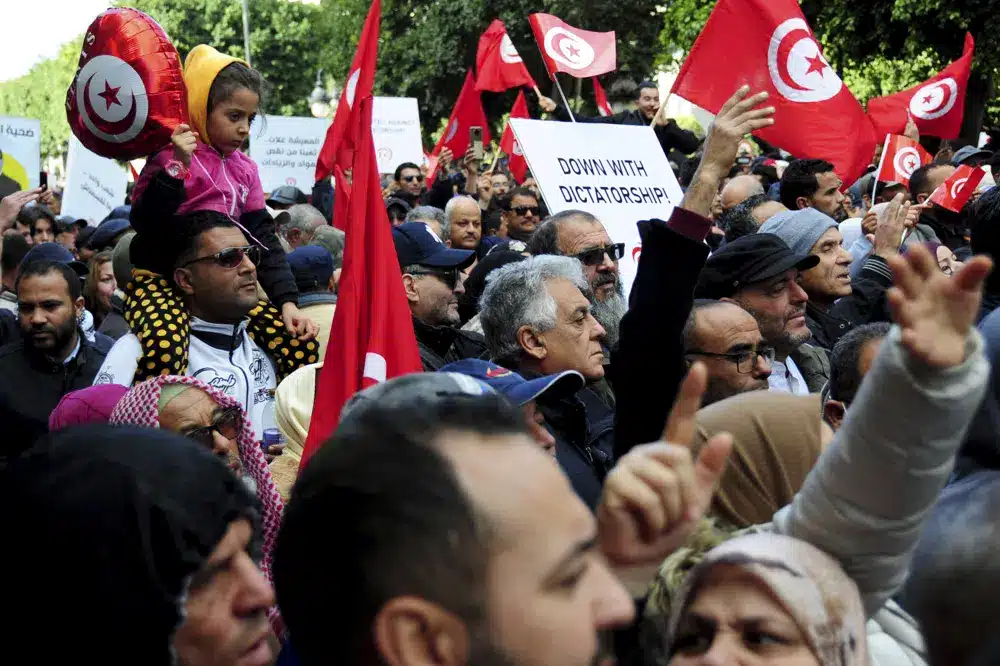Thousands of people protested in Tunisia’s capital, Tunis, on Saturday for a rally organized by the country’s most powerful labour union, the UGTT, to demonstrate against the government under President Kais Saied. The protest, one of the largest since Saied dismissed the previous government and suspended parliament in July 2021, came after a spate of arrests of the president’s political opponents in recent weeks.
Who protested in Tunisia?
Starting at the Mohamed Ali Hammi plaza, thousands marched along the capital’s main Habib Bourguiba avenue shouting slogans such as “Freedom, the police state is over”, “Saied, your time is over” and “IMF government, the people are invincible”.
Noureddine Tabboubi, the head of the Tunisian General Labor Union, addressed the crowd before the march, stating that “no matter how costly it is, we will not fear prisons and assassinations, and we will always stand on the side of equality and justice”. Tabboubi referred to the recent arrests and said, “I salute all the activists and politicians in Mornaguia prison.”
Most of those who protested in Tunisia and were arrested have been accused of “conspiracy against state security”. Tabboubi said the UGTT would not remain silent in the face of a systematic targeting of rights and freedoms in the country.
“Tunisia will not be a land of tyranny and oppression,” he said. Several other Tunisian organizations and political parties also participated in Saturday’s rally.
Hamma Hammami, secretary-general of the Workers Party, called on Saied to resign, saying it was the only feasible option for the country. “He is seeking to intimidate us, but we were never afraid and we will never be afraid of Saied,” Hammami told reporters at the rally.
Why are tensions so high in Tunisia?
Tensions between the UGTT and Saied have escalated following the recent arrest of a member of its transport sector federation and the President’s rejection of a national dialogue that the labour union has been attempting to organize together with the Lawyers Bar, the Tunisian League for Human Rights, and the Tunisian Forum for Social and Economic Rights.
“The national dialogue initiative is in its final stages and will be announced in the coming few days,” Tabboubi said on Saturday.
Saied accused the UGTT of trying to involve foreign parties in Tunisian affairs after it invited representatives of international trade unions to join Saturday’s protest. Tunisian authorities turned back Spanish trade unionist Marco Perez Molina upon his arrival in Tunis on Thursday and also banned representatives from the International Trade Union Confederation from entering the country.
The UGTT called the moves “unnecessary” and part of a wider clampdown on trade unions. The union said it would hold a meeting of its executive bureau on Tuesday, which would set a date for a meeting of its national administrative authority, which brings together representatives of all the union federations.
The crackdown is the biggest since Saied’s seizure of powers and his opponents say it is ever more clear that he has dismantled the democracy won in the 2011 revolution that triggered the Arab Spring and will end the freedoms it brought. Saied has denied his actions were a coup, saying they were legal and necessary to save Tunisia from chaos.
Over recent weeks, police have arrested more than a dozen prominent opposition figures, mostly tied to the coalition of parties and protesters that protested on Sunday, accusing them of conspiring against state security. Those arrested in recent weeks include politicians from Ennahdha, which was the biggest party in the shuttered parliament, leaders of a protest group, the head of Tunisia’s main independent media outlet, and a prominent businessman.
Image Credit: AP Photo/Hassene Dridi



















